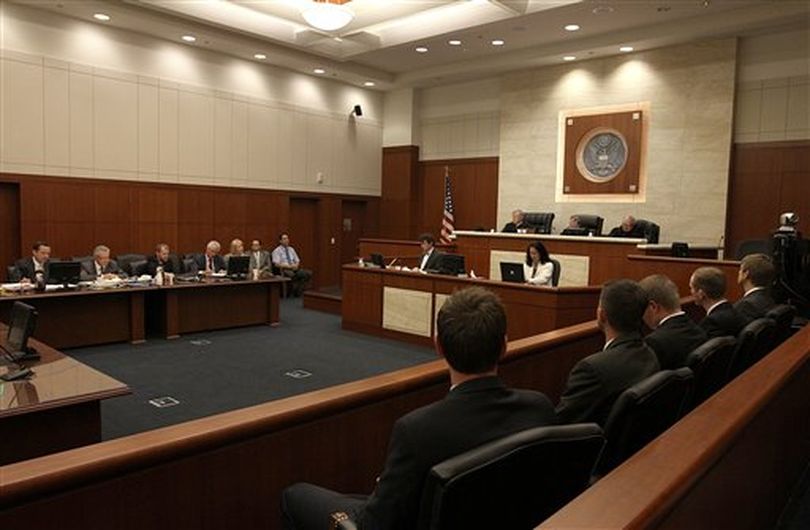Idaho sees 9th Circuit in action in key parental rights case

A capacity crowd filled a sixth-floor courtroom at Boise's federal courthouse today, as three judges from the 9th Circuit U.S. Court of Appeals sharply questioned attorneys from both sides in a parents' rights case; it was the first time the 9th Circuit has held a special sitting in Boise since 2003. Attorneys, reporters, law students and law clerks were among those looking on, and the court permitted cameras in the courtroom, so a TV camera quietly rolled in a corner, and an AP photographer unobtrusively captured the event in photos.
"It's a great opportunity for the legal community in Idaho to be able to watch the 9th Circuit in action, something we don't get to see a lot of times," said U.S. Attorney for Idaho Wendy Olson, who was in the audience, as were all of the legal externs from her office. "This was what we call a 'hot bench,' where there are lots of questions for the lawyers." She called it "a great opportunity in a case that's of great importance for the legal community."
The case involves a 5-week-old baby whose mother brought her to St. Luke's emergency room in 2002 with a low-grade fever. Doctors insisted on giving the infant a spinal tap and antibiotics because of the slight but serious risk of meningitis. The mother refused to consent, asking instead to first call and confer with her husband and naturopathic physician; the hospital called in a social worker, who called in police and Child Protective Services, and the child was seized from her mother's custody and the treatment given while the mother was held in a small room nearby and not permitted to use a phone. The test found the baby just had a cold. The parents had to hire a lawyer to regain custody of their child, which they got back about 36 hours later after going to court.
The parents, Corissa and Eric Mueller, sued, but a jury ruled against them, and they had to pay trial costs for the city, the emergency room doctor and the hospital. Today marked the second appeal to the 9th Circuit in the case, in which the Washington, D.C.-based Center for Individual Rights is representing the Muellers without charge. "I think parents should care about what happens to the extent they want to make medical decisions for their children," said Michael Rosman, attorney for the center. If what happened in the Muellers' case is legal, he said, police can seize a child from its parents' custody simply because the parents bring the child to an emergency room with minor symptoms. "If that's what the law is, I think parents should be terribly concerned."
Rich Hall, attorney for the emergency room doctor, Dr. Richard McDonald, told the judges, "I've tried these cases for 40 years. I've seen the other side," when a doctor didn't test for meningitis or didn't test quickly enough; it can quickly be fatal to an infant. "In this case, what Dr. McDonald did was consistent with the standard of care."
The appeal raises several points, including objecting to the admission of the testimony of an expert witness who told the jury he believed the child had meningitis and the treatment saved her, even though the test showed otherwise; and objecting to instructions given to the jury. If the appeal is successful, the jury verdict likely would be overturned and the case returned to Idaho for a new trial. Today's 9th Circuit panel consisted of Judges Randy Smith, Stephen Trott and J. Clifford Wallace.
